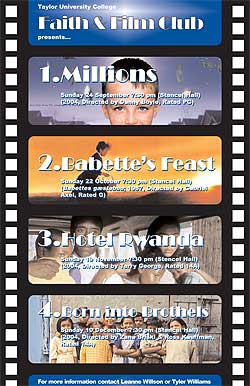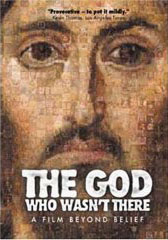 Tonight The Academy of Motion Picture Arts and Sciences will put on their yearly spectacle called the Oscars. I may watch the 78th Annual Academy Awards tonight, though I find the actual award ceremony to be way too long and way too boring — and I just can’t stand all of the glitz and glamour that surrounds the telecast. I really don’t care what so-and-so wears on the red carpet or what expensive gifts the already grossly over-paid and self-important celebrities received for the hard work of reading a prompter when presenting an award!
Tonight The Academy of Motion Picture Arts and Sciences will put on their yearly spectacle called the Oscars. I may watch the 78th Annual Academy Awards tonight, though I find the actual award ceremony to be way too long and way too boring — and I just can’t stand all of the glitz and glamour that surrounds the telecast. I really don’t care what so-and-so wears on the red carpet or what expensive gifts the already grossly over-paid and self-important celebrities received for the hard work of reading a prompter when presenting an award!
That being said, I like films and I consider myself an armchair movie buff. So I am interested in who the winners are; if only to see how misguided the Academy is! At any rate, if you are interested, a list of the nominees is available here. The only films that I hope win an award include A History of Violence (2005; IMDb) and Wallace & Gromit in The Curse of the Were-Rabbit (2005; IMDb); otherwise I don’t have any strong opinions.
 More significantly, the 26th Annual Golden Raspberry (Razzie) Awards were just announced. Legendary actors such as Rob Schneider, Jenny McCarthy, Hayden Christensen, and Paris Hilton all won well-deserved awards. The worst picture award (as well as three ohers) went to Dirty Love (2005; IMDb), which I didn’t manage to watch this last year — actually I hadn’t even heard of the film! (Don’t worry if you didn’t see it either; from the reviews it received it appears to have been very pathetic!). Perhaps the best category was the “Most Tiresome Tabloid Targets” in which Tom Cruise, Katie Holmes, Oprah Winfrey’s Couch, The Eiffel Tower, and “Tom’s Baby” were all honoured.
More significantly, the 26th Annual Golden Raspberry (Razzie) Awards were just announced. Legendary actors such as Rob Schneider, Jenny McCarthy, Hayden Christensen, and Paris Hilton all won well-deserved awards. The worst picture award (as well as three ohers) went to Dirty Love (2005; IMDb), which I didn’t manage to watch this last year — actually I hadn’t even heard of the film! (Don’t worry if you didn’t see it either; from the reviews it received it appears to have been very pathetic!). Perhaps the best category was the “Most Tiresome Tabloid Targets” in which Tom Cruise, Katie Holmes, Oprah Winfrey’s Couch, The Eiffel Tower, and “Tom’s Baby” were all honoured.
Now to some movies truly worth watching…
Essential Films Follow-Up
I have enjoyed the response to my two lists of “Essential Films for Theologians” (see my “Essential Films for Theologians: The ‘Director’s Cut’” and my “Essential Films of 2005 for Theologians – Extended Edition“). In the discussion of my lists (both on my blog and Ben Myer‘s Faith and Theology here and here), individuals have noted many excellent films that are definitely worth watching. In many cases these are films that I seriously considered adding to my own lists or are movies that I really should have considered but failed to remember them. In addition, David Williamson also came up with his own list of Top Ten Spiritual Films which is worthy of a gander.
In regards to my Essential Films for Theologians list, there were a number of other films highlighted in the comments that are definitely worthy of viewing. Most of them I had considered including on my list, while others I had not even heard of before and are now on my “films to view” list. Perhaps the only film which I feel I should have included for sentimental reasons is The Princess Bride (1987; IMDb).
Here are some other movies worth watching that were mentioned in the comments (in alphabetic order):
- Andrey Rublyov (1969; IMDb)
- The Best of Youth (La Meglio gioventù; 2003; IMDb)
- The Butterfly (La Lengua de las Mariposas; 1999; IMDb)
- Come and See (Idi i smotri; 1985; IMDb)
- Diary of a Country Priest (Journal d’un curé de campagne; 1951; IMDb)
- Fight Club (1999; IMDb)
- The Game (1997; IMDb)
- Itallian for Beginners (Italiensk for begyndere; 2000; IMDb)
- Mean Streets (1973; IMDb)
- Ordet (1955; IMDb)
- Passion of Joan of Arc (La Passion de Jeanne d’Arc; 1928; IMDb)
- The Pledge (2001; IMDb)
- Pulp Fiction (1994; IMDb)
- Pi (1998; IMDb)
- Run Lola Run (Lola rennt; 1998; IMDb)
A couple films that I did not include in my “Essential Films of 2005 for Theologians” list or in the extended discussion, included Millions (2004; IMDb) and Stage Beauty (2004; IMDb).
All in all, there are many excellent films — as well as many not-so-excellent films — produced every year. The challenge, of course, is being astute enough to figure out which ones are worthy of our time! I only hope that I may have highlighted a few films that are worthy of viewing!


 The other day I watched the straight to DVD documentary by Brian Flemming, The God Who Wasn’t There (
The other day I watched the straight to DVD documentary by Brian Flemming, The God Who Wasn’t There ( Tonight The Academy of Motion Picture Arts and Sciences will put on their yearly spectacle called the Oscars. I may watch the 78th Annual Academy Awards tonight, though I find the actual award ceremony to be way too long and way too boring — and I just can’t stand all of the glitz and glamour that surrounds the telecast. I really don’t care what so-and-so wears on the red carpet or what expensive gifts the already grossly over-paid and self-important celebrities received for the hard work of reading a prompter when presenting an award!
Tonight The Academy of Motion Picture Arts and Sciences will put on their yearly spectacle called the Oscars. I may watch the 78th Annual Academy Awards tonight, though I find the actual award ceremony to be way too long and way too boring — and I just can’t stand all of the glitz and glamour that surrounds the telecast. I really don’t care what so-and-so wears on the red carpet or what expensive gifts the already grossly over-paid and self-important celebrities received for the hard work of reading a prompter when presenting an award! More significantly, the
More significantly, the  As a companion piece to my previous post, “
As a companion piece to my previous post, “ Now, before you chide me for not including this or that film, I must confess a limitation with this list: it only contains films that I have viewed. My list of “Films I wished I viewed” before making my list include, Brokeback Mountain; Capote; Caché; Dear Frankie; Good Night, and Good Luck; Cinderella Man; Murderball; Paradise Now; Saraband; The Squid and the Whale; Transamerica; and Walk the Line. While I go to quite a few movies in any given year, I typically wait for the DVD release for films I do not deem necessary to view on the big screen, which explains why I have yet to see films like Walk the Line or Brokeback Mountain, among others.
Now, before you chide me for not including this or that film, I must confess a limitation with this list: it only contains films that I have viewed. My list of “Films I wished I viewed” before making my list include, Brokeback Mountain; Capote; Caché; Dear Frankie; Good Night, and Good Luck; Cinderella Man; Murderball; Paradise Now; Saraband; The Squid and the Whale; Transamerica; and Walk the Line. While I go to quite a few movies in any given year, I typically wait for the DVD release for films I do not deem necessary to view on the big screen, which explains why I have yet to see films like Walk the Line or Brokeback Mountain, among others. You will notice that some of films have a 2004 release date; these are films that had an initial limited release in 2004 (usually at a film festival) but had a more extensive public release in 2005 (including DVD releases in a few cases).
You will notice that some of films have a 2004 release date; these are films that had an initial limited release in 2004 (usually at a film festival) but had a more extensive public release in 2005 (including DVD releases in a few cases).